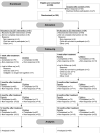Effects of a Cognitive Behavioral Therapy Intervention Trial to Improve Disease Outcomes in Children with Inflammatory Bowel Disease
- PMID: 27542131
- PMCID: PMC4995069
- DOI: 10.1097/MIB.0000000000000881
Effects of a Cognitive Behavioral Therapy Intervention Trial to Improve Disease Outcomes in Children with Inflammatory Bowel Disease
Abstract
Background: Studies testing the efficacy of behavioral interventions to modify psychosocial sequelae of inflammatory bowel disease in children are limited. This report presents outcomes through a 6-month follow-up from a large randomized controlled trial testing the efficacy of a cognitive behavioral intervention for children with inflammatory bowel disease and their parents.
Methods: One hundred eighty-five children aged 8 to 17 years with a diagnosis of Crohn's disease or ulcerative colitis and their parents were randomized to one of two 3-session conditions: (1) a social learning and cognitive behavioral therapy condition or (2) an education support condition designed to control for time and attention.
Results: There was a significant overall treatment effect for school absences due to Crohn's disease or ulcerative colitis (P < 0.05) at 6 months after treatment. There was also a significant overall effect after treatment for child-reported quality of life (P < 0.05), parent-reported increases in adaptive child coping (P < 0.001), and reductions in parents' maladaptive responses to children's symptoms (P < 0.05). Finally, exploratory analyses indicated that for children with a higher level of flares (2 or more) prebaseline, those in social learning and cognitive behavioral therapy condition experienced a greater reduction in flares after treatment.
Conclusions: This trial suggests that a brief cognitive behavioral intervention for children with inflammatory bowel disease and their parents can result in improved child functioning and quality of life, and for some children may decrease disease activity.
References
-
- Baldassano RN, Piccoli DA. Inflammatory bowel disease in pediatric and adolescent patients. Gastroenterol Clin North Am. 1999;28(2):445–458. - PubMed
-
- Mamula P, Markowitz JE, Baldassano RN. Inflammatory bowel disease in early childhood and adolescence: special considerations. Gastroenterol Clin North Am. 2003;32(3):967–995. - PubMed
-
- Motil KJ, Grand RJ, Davis-Kraft L, Ferlic LL, Smith EO. Growth failure in children with inflammatory bowel disease: a prospective study. Gastroenterology. 1993;105(3):681–691. - PubMed
-
- Harper PH, Fazio VW, Lavery IC, et al. The long-term outcome in Crohn's disease. Dis Colon Rectum. 1987;30(3):174–179. - PubMed
-
- Kurata JH, Kantor-Fish S, Frankl H, Godby P, Vadheim CM. Crohn's disease among ethnic groups in a large health maintenance organization. Gastroenterology. 1992;102(6):1940–1948. - PubMed
Publication types
MeSH terms
Grants and funding
LinkOut - more resources
Full Text Sources
Other Literature Sources
Medical


